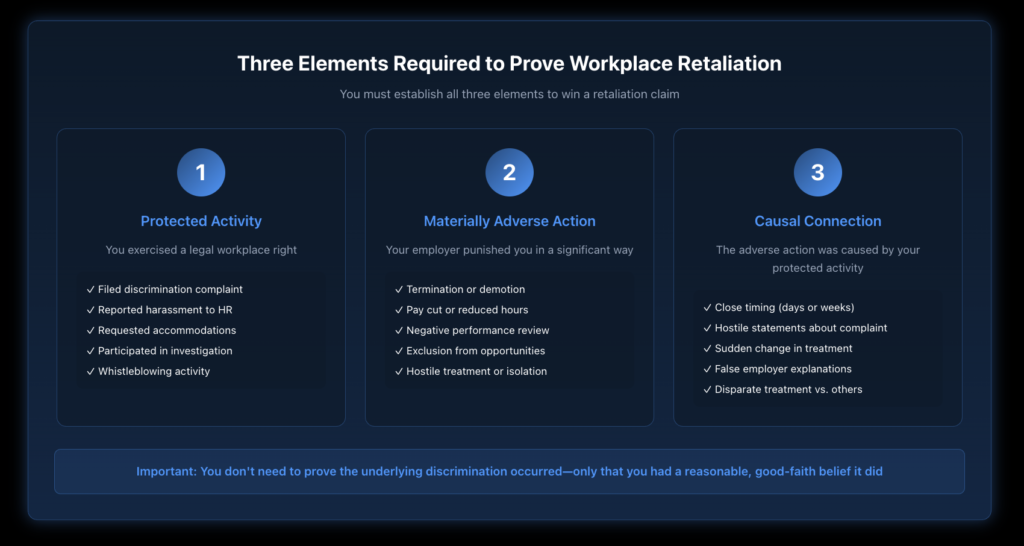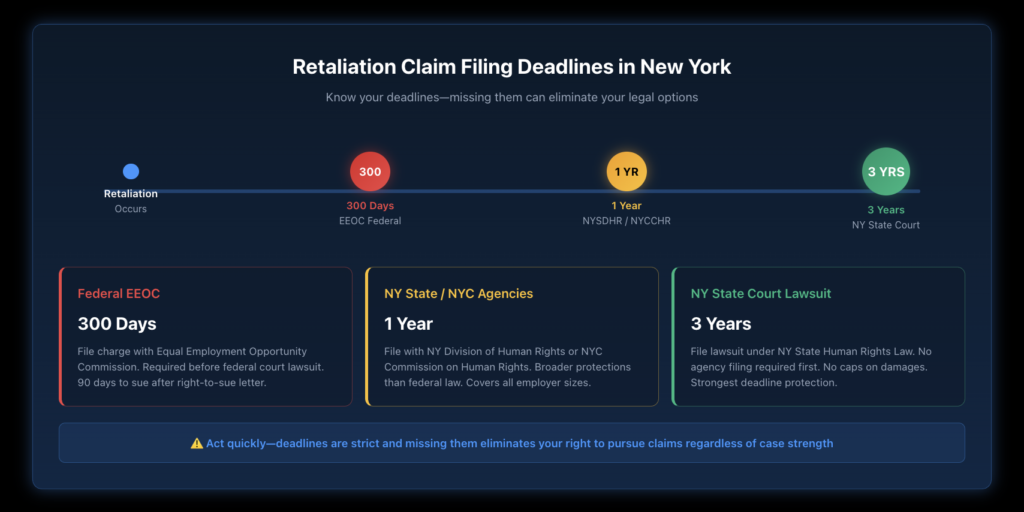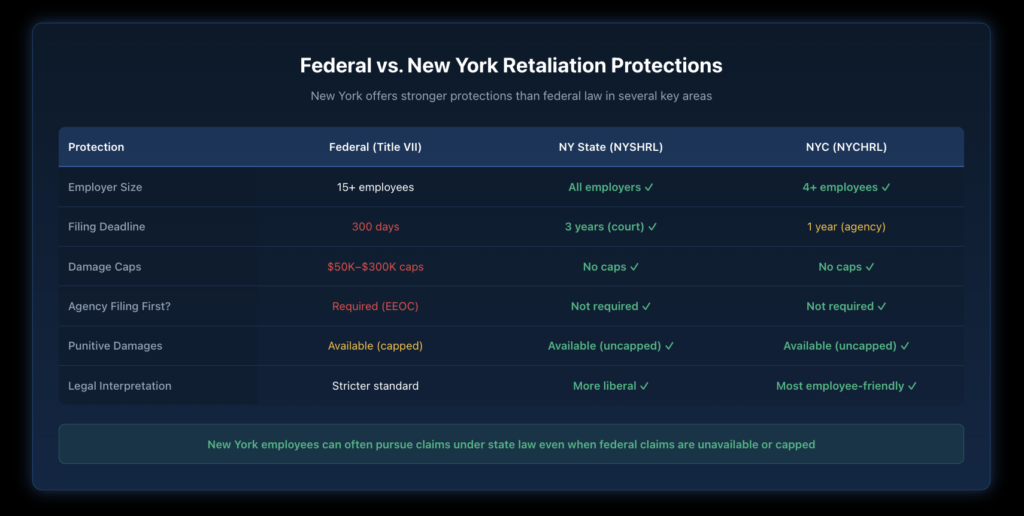What Is Employer Retaliation and How Can You Fight Back?
Employer retaliation happens when your boss or company punishes you for exercising your legal rights at work—filing a discrimination complaint, reporting harassment, requesting accommodations, or participating in a workplace investigation. Under federal laws like Title VII of the Civil Rights Act and New York’s Human Rights Laws, employers cannot take adverse action against you for engaging in “protected activity.” This includes obvious punishments like termination or demotion, but also subtler actions like schedule changes, negative performance reviews, exclusion from meetings, or creating a hostile work environment that makes your job unbearable. New York offers some of the strongest anti-retaliation protections in the country, giving employees up to three years to file claims under state law—significantly longer than the 300-day federal deadline.

Take action now and let us fight for justice on your behalf! Contact Nisar Law Group, P.C. today at (212) 600-9534 for a consultation with a retaliation lawyer near you.
What Activities Are Protected From Employer Retaliation?
What Makes an Activity “Protected” Under Anti-Retaliation Laws?
The law protects employees who assert their rights against workplace discrimination, harassment, or other illegal conduct. According to the EEOC, protected activities fall into two main categories: “participation” and “opposition.”
Participation means taking part in any employment discrimination proceeding—filing an EEOC charge, serving as a witness, providing evidence, or cooperating with investigations. This protection applies regardless of whether the underlying discrimination claim succeeds.
Opposition covers the many ways you might push back against perceived illegal conduct—complaining to HR about harassment, refusing to follow discriminatory orders, or supporting a coworker’s discrimination complaint. The key is having a reasonable, good-faith belief that something illegal occurred.
What Specific Actions Does the Law Protect?
New York and federal law protect employees who engage in these activities:
- Filing or being a witness in a discrimination complaint or lawsuit
- Reporting sexual harassment to HR or management
- Requesting reasonable accommodations for disability or religious practices
- Complaining about wage violations or safety hazards
- Whistleblowing about illegal company activities
- Taking protected leave under FMLA
- Filing workers’ compensation claims
- Refusing to participate in illegal activities
- Answering questions during workplace investigations
The EEOC’s enforcement guidance makes clear that protection extends to informal complaints—you don’t need to use legal terminology or file formal paperwork to be protected from retaliation.
What Actions Count as Illegal Retaliation?
What Is “Materially Adverse Action” Under Retaliation Law?
Retaliation isn’t limited to firing. Any employer action that “might deter a reasonable person from engaging in protected activity” can constitute illegal retaliation. This standard, established by the Supreme Court, recognizes that employers can effectively punish employees through actions beyond termination.
Common forms of workplace retaliation include:
- Termination or constructive discharge
- Demotion or denial of promotion
- Pay cuts or reduced hours
- Transfer to less desirable positions or locations
- Negative performance evaluations
- Exclusion from meetings, projects, or opportunities
- Increased scrutiny or micromanagement
- Spreading rumors or damaging your reputation
- Giving negative job references
The action doesn’t have to occur at work. If your employer threatens to report your immigration status, interferes with your job search, or takes other actions outside the workplace that would discourage someone from asserting their rights, that can still be retaliation.
What Is Silent Retaliation and How Do You Recognize It?
Silent retaliation—sometimes called subtle or indirect retaliation—involves actions that are harder to prove but equally damaging to your career. Unlike obvious termination or demotion, silent retaliation often flies under the radar while systematically undermining your position.
Watch for these warning signs:
- Sudden exclusion from emails, meetings, or communications you previously received
- Being passed over for training or advancement opportunities without explanation
- Colleagues are becoming distant or avoiding you after management “discussions.”
- Your workloadis increasing dramatically while resources decrease
- Shift changes or schedule modifications that conflict with family obligations
- Projects reassigned to others without a clear business justification
- The “freeze out”—being ignored or isolated by supervisors
Silent retaliation is particularly insidious because each individual action might seem minor. The pattern matters. Document every incident with dates, times, and details, as these patterns often prove retaliation when no single action would.

How Do You Prove Your Boss Is Retaliating Against You?
What Three Elements Must You Prove for a Retaliation Claim?
To establish a retaliation claim, you must prove three things:
- You engaged in protected activity. This means you complained about discrimination, participated in an investigation, requested accommodations, or took other action that the law protects. You don’t need to prove actual discrimination occurred—only that you had a reasonable, good-faith belief something was wrong.
- Your employer took materially adverse action against you. This is any action significant enough that it might discourage a reasonable person from making complaints. Termination and demotion clearly qualify, but so can transfers, schedule changes, or even exclusion from workplace activities.
- A causal connection exists between your protected activity and the adverse action. You must show that your employer’s action was motivated by your protected activity. Timing is often critical—adverse action occurring shortly after protected activity creates an inference of retaliation.
Why Does Timing Matter So Much in Retaliation Cases?
Temporal proximity—the closeness in time between your protected activity and the adverse action—is often the strongest evidence of retaliation. If you filed an HR complaint on Monday and got fired on Wednesday, that timing speaks volumes about your employer’s motivation.
Courts recognize suspicious timing as evidence of retaliatory intent. The shorter the gap, the stronger the inference. However, retaliation can occur months or even years later if other evidence supports a retaliatory motive—hostile comments about your complaint, deviation from normal procedures, or comparative evidence showing you were treated differently than employees who didn’t engage in protected activity.
Beyond timing, look for:
- Statements showing anger or frustration about your complaint
- Sudden negative performance reviews after years of positive evaluations
- Discipline for infractions that previously went unpunished
- False or shifting explanations for the adverse action
- Disparate treatment compared to employees who didn’t complain
How Should You Document Workplace Retaliation?
Building a retaliation case requires documentation. Start the moment you engage in protected activity and continue until the situation resolves.
Create a paper trail by:
- Keeping copies of your original complaint or request
- Saving all emails, texts, and written communications
- Documenting conversations immediately after they occur (date, time, participants, what was said)
- Preserving performance reviews, especially those showing satisfactory work before your complaint
- Noting witnesses to retaliatory conduct
- Keeping records of schedule changes, assignment shifts, or other adverse actions
- Saving any written explanations your employer provides for adverse actions
Use your personal devices and accounts for documentation—not company equipment. Assume your employer monitors company email and communications. Forward relevant documents to your personal account before any adverse action occurs, if permitted by company policy.
What Are Your Legal Options After Experiencing Retaliation?
Where Can You File a Retaliation Complaint?
New York employees have several options for pursuing retaliation claims, each with different deadlines and procedures:
Federal EEOC: You generally have 300 days from the retaliatory action to file with the Equal Employment Opportunity Commission. The EEOC investigates and may pursue your claim or issue a “right to sue” letter allowing you to file in federal court.
New York State Division of Human Rights: You have one year to file with the NYSDHR. State law applies to all employers regardless of size and offers protections similar to federal law.
New York City Commission on Human Rights: NYC employees can file with the NYCCHR within one year. The NYC Human Rights Law provides some of the strongest worker protections in the country.
Civil Court: Under the New York State Human Rights Law, you have three years to file a lawsuit in state court—significantly longer than federal deadlines. You don’t need to file with an agency first before going to court under state law.
What Damages Can You Recover in a Retaliation Case?
Successful retaliation claims can recover substantial compensation:
- Back pay: Lost wages from the date of the adverse action
- Front pay: Future lost earnings if reinstatement isn’t practical
- Reinstatement: Return to your former position (rarely ordered but available)
- Compensatory damages: Compensation for emotional distress, anxiety, and related harm
- Punitive damages: Additional damages to punish egregious employer conduct
- Attorney’s fees: Your employer may be required to pay your legal costs
New York state and city law have no caps on compensatory or punitive damages for retaliation claims. Federal law caps certain damages based on employer size, making state claims often more valuable. The NYC Human Rights Law allows recovery for emotional harm even without economic damages, making it particularly powerful for employees facing retaliation.

What Should You Do If Your Manager Is Targeting You?
How Should You Respond to Suspected Retaliation?
If you believe your employer is retaliating against you, take these steps immediately:
Don’t quit. As difficult as the situation may be, resigning often weakens your legal position. Unless conditions become truly intolerable—potentially supporting a constructive discharge claim—staying employed preserves more legal options.
Continue performing well. Don’t give your employer legitimate reasons to discipline you. Show up on time, meet deadlines, and document your continued good performance. Your employer will look for any justification for adverse actions—don’t provide one.
Document everything. Create detailed, contemporaneous records of every retaliatory action. Include dates, times, witnesses, and exact quotes when possible. Note patterns and changes from how you were treated before engaging in protected activity.
Report internally. Many retaliation claims benefit from showing you gave your employer a chance to address the problem. Report the retaliation to HR or through your company’s complaint process. Document your report and any response—or lack thereof.
Consult an attorney promptly. Filing deadlines are strict, and early legal guidance helps avoid costly mistakes. Many employment attorneys offer free consultations and work on contingency—you pay nothing unless you recover compensation.
When Should You Contact an Employment Lawyer?
Consider consulting an attorney as soon as you experience adverse treatment following protected activity. Early involvement helps:
- Preserve evidence before it disappears
- Ensure you meet all filing deadlines
- Evaluate whether your situation constitutes illegal retaliation
- Develop strategies for documenting ongoing retaliation
- Review any severance agreement before signing
- Handle communications with your employer to avoid costly mistakes
The complexity of retaliation law—with overlapping federal, state, and city protections—makes professional guidance valuable. Attorneys understand which claims to pursue, how to gather evidence effectively, and how to negotiate settlements that reflect your full damages.
How Do Retaliation Claims Differ From Discrimination Claims?
Can You Win a Retaliation Claim Even If Discrimination Didn’t Occur?
Here’s something that surprises many employees: you can win a retaliation claim even if the underlying discrimination never happened. The law protects employees who report potential discrimination in good faith—regardless of whether the original complaint was legally valid.
If you complained about gender discrimination and your employer fired you for complaining, you have a retaliation claim. It doesn’t matter if a court would have found the original conduct discriminatory. What matters is:
- You reasonably believed discrimination was occurring
- You reported it in good faith
- Your employer punished you for reporting
This protection exists because the anti-discrimination laws depend on employees speaking up. If employers could freely punish anyone whose complaint didn’t result in a finding of discrimination, employees would be afraid to report genuine concerns. The chilling effect would undermine the entire system of workplace protections.
Why Are Retaliation Claims Often Stronger Than Discrimination Claims?
Retaliation claims frequently succeed even when underlying discrimination claims fail. There are several reasons for this pattern.
First, retaliation is often more obvious. Discrimination may involve subtle bias and comparative treatment, but retaliation usually involves clear “before and after” evidence—your employer treated you one way before you complained and differently after.
Second, timing creates powerful evidence. When adverse action follows protected activity by days or weeks, the inference of retaliation is difficult to explain away. Discrimination cases rarely have such clear timing evidence.
Third, employers sometimes overreact to complaints, creating additional evidence. Angry emails about “troublemakers,” hostile comments about complaints, or obvious punishment following reports all strengthen retaliation claims in ways that discrimination claims may lack.
Ready to Take Action?
If you’re experiencing workplace retaliation in New York, you don’t have to face it alone. Retaliation cases can be complex, but the law provides strong protections for employees who assert their rights. Nisar Law Group represents employees throughout New York and New Jersey in retaliation claims involving discrimination complaints, whistleblowing, accommodation requests, and other protected activities. Contact us today for a consultation to discuss your situation and understand your legal options.
Take action now and let us fight for justice on your behalf! Contact Nisar Law Group, P.C. today at (212) 600-9534 for a consultation with a retaliation lawyer near you.
- Age Discrimination
- Criminal Record Discrimination
- Disability Discrimination
- Discrimination
- Education Law & 3020A Hearings
- Employer Retaliation
- Familial Status Discrimination
- Gender Discrimination
- Hostile Work Environment
- LGBT Discrimination
- Military Discrimination
- Overtime & Wage Hour Cases
- Pregnancy Discrimination
- Quid Pro Quo
- Race & Nationality Discrimination
- Religious Discrimination
- Representation for Banking Professionals
- Representation for Medical Professionals
- Section 75 Hearings
- Severance Negotiation
- Executive Compensation
- Sexual Harassment
- Sexual Orientation Discrimination
- Whistleblower Actions
- Wrongful Termination
Why We're the Right Choice
- Seasoned Litigators Who Have Handled Numerous Jury & Bench Trials
- Providing Representation with Clarity, Honesty & Integrity
- Building Long-Term Affiliations & Relationships
- Offering Consultations for All Case Types We Handle
Frequently Asked Questions About: Workplace Retaliation
A classic example of retaliation is getting fired shortly after filing an HR complaint about sexual harassment. But retaliation takes many forms beyond termination. If you requested disability accommodations and suddenly found yourself transferred to a less desirable shift, excluded from team meetings, or given a negative performance review despite years of positive evaluations, that could be retaliation. The key is that your employer took harmful action because you exercised a legal right—not just that they treated you poorly.
Proving retaliation requires showing three things: you engaged in protected activity, your employer took adverse action against you, and your protected activity caused that adverse action. Timing is often your strongest evidence—if you were fired two weeks after filing a discrimination complaint, that timing alone suggests retaliation. Other evidence includes sudden negative reviews after years of positive ones, hostile comments about your complaint, or treatment that differs from that of colleagues who didn’t file complaints. Document everything and preserve all communications.
Under federal and New York law, retaliation is any action “materially adverse” enough to discourage a reasonable person from complaining about discrimination or exercising workplace rights. This goes beyond termination to include demotions, pay cuts, schedule changes, transfers, exclusion from opportunities, negative references, increased scrutiny, or even harassment by coworkers that management tolerates. The action doesn’t need to be severe—just significant enough that it might deter others from speaking up.
Retaliation claims can yield substantial compensation, including back pay, front pay, emotional distress damages, and potentially punitive damages—especially under New York law, which has no caps on damages. Most employment attorneys work on contingency, meaning you pay nothing unless you win. Whether it’s “worth it” depends on your evidence strength, your damages, and your goals. Many employees find that holding employers accountable—even through settlement negotiations—provides both financial recovery and a sense of justice.
Silent retaliation is a subtle punishment that’s harder to prove but equally damaging. Instead of firing you outright, your employer might exclude you from meetings, pass you over for promotions without explanation, give your projects to others, spread rumors, or simply freeze you out socially and professionally. Each individual action might seem minor, but the pattern demonstrates retaliation. Document every incident because courts recognize that cumulative treatment can constitute illegal retaliation even when no single action would.
Every retaliation claim requires proving three elements: first, you engaged in protected activity like filing a discrimination complaint or requesting accommodations; second, your employer took materially adverse action against you; third, a causal connection exists between your protected activity and the adverse action. You don’t need to prove the underlying complaint was valid—only that you had a reasonable, good-faith belief that something was wrong and your employer punished you for speaking up.
Start documenting immediately—every incident, conversation, and change in treatment with dates, times, and witnesses. Continue performing your job well to avoid giving your employer legitimate grounds for discipline. Report the targeting through your company’s complaint process and save proof of your report. Don’t resign unless conditions become truly unbearable, as staying employed preserves more legal options. Consult an employment attorney promptly to understand your rights and filing deadlines before they expire.
Certain phrases from management or HR should raise immediate red flags. Comments like “troublemaker,” “not a team player,” “difficult to work with,” or “creates problems” following a complaint may indicate a retaliatory attitude. References to your “attitude” changing after you reported concerns, suggestions that you’re “too focused” on your complaint, or warnings about being “distracted from your job” by pursuing rights can all signal retaliation. Document these exact phrases—they often become key evidence in proving retaliatory intent.
